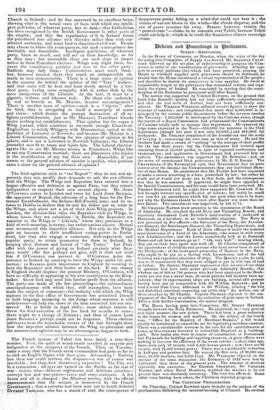The Irish agitators stick to "the Repeal": they do not,
and ap- parently dare not, modify their demands to suit the new alliance with the Whigs. The Whigs and Repealers have entered into a league offensive and defensive as against PEEL, but they remain independent as respects their own several objects. Mr. JOHN O'CONNELL comes to London and votes for Lord Jolts; RUSSELL, the opponent of Repeal, the advocate of a long lease for the Pro- testant Establishment, the Reform-Bill-Finality man ; and be re- turns to Dublin to declare that he and his father put no trust in the Whigs, and abate not a jot of their Anti-Whig projects. In London, the division-lists class the Repealers with the Whigs, to whose forces they are subsidiary : in Dublin, the Repealers are ,superior to the Whigs or " Liberals," whom they patronize as a .kind of sell-meaning, honorary, but rather useless clients. Mutual uses recommend this imperfect alliance. Not only do the Whigs' gain an increase to their insufficient voting-power in Parlia- ment, but they also engage a numerous, well-organized, and popular party, to retain possession for them in Ireland, by keeping alive distrust and hatred of "the Tories." Let PEEL offer with the power of giving to Ireland precisely what Rus- SELL would offer but perhaps not give, still it shall not avail him if O'CONNELL can prevent it. O'CONNELL gains im- portance in Ireland by seeming to have the Whigs under his pro- tection; as RUSSELL gains importance in England by seeming to have the Repealers and their leader at his back. If any chance in England should displace the present Ministry, O'CortstELL will have no difficulty in appearing to his own countrymen as the King- maker. Good luck may send him further profit from the alliance. The party-use made of the law proceedings—the extraordinary ' unscrupulousness with which they, still incomplete, have been made the subject of comment—the audacity with which the Whig aspirant to the first office of Government has permitted himself to hold language menacing to the 3uclge whose sentence is still undelivered—all help the views of the man convicted but not sen- tenced. He is fertile in legal shifts ; more delays remain to throw the final execution of the law back for months to come ; there might be a change of Ministry ; and then of course Lord Joust RUSSELL'S protégé could not be forgotten. These obvious inferences from the remarkable events of the last fortnight show bow the imperfect alliance between the Whig ex-placeman and the unsentenced agitator may be an advantageous league to both.


























 Previous page
Previous page